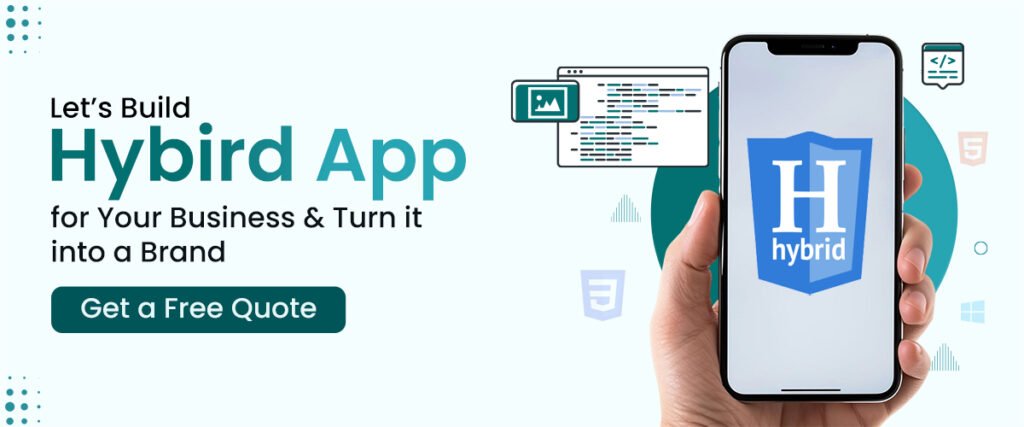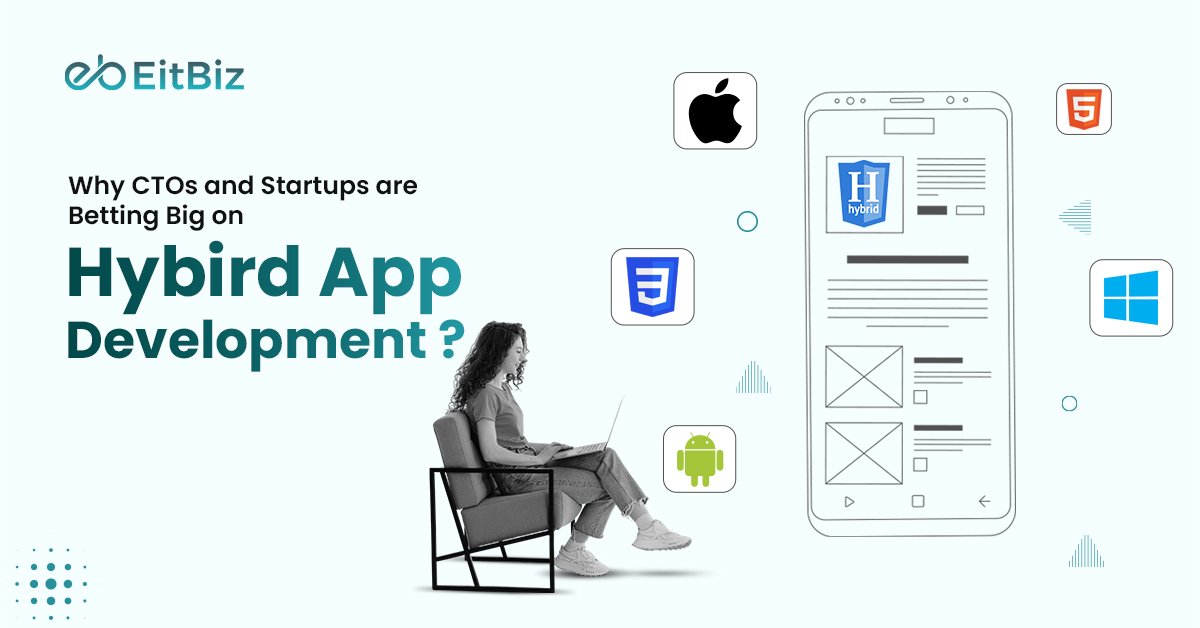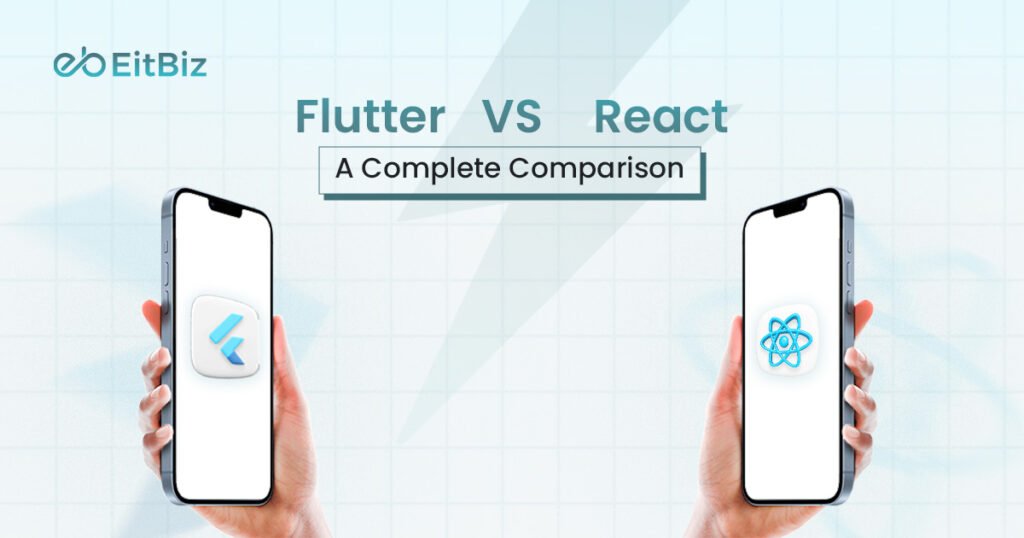You opened your startup, great!
But you may now be wondering – How to attract your target audience? How to turn your visitors into potential customers?
As a startup, these questions might be buzzing around your head! But hey, don’t worry!
I have got a one-stop solution to all queries, which is none other than “Hybrid app development”!
To put it simply, a hybrid app development refers to building dedicated mobile apps using web technologies (including CSS HTML, & JavaScript). These apps can easily run across both mobile and web platforms using a code base.
Many people, however, confuse it with native app development and end up making the wrong move.
Thus, understanding hybrid app development is incredibly quintessential for your business growth!
Let’s dive in!
Growing Hype of Hybrid App Development Worldwide
Though Hybrid app development has become a popular choice for startups and businesses worldwide, many organizations are already utilizing its potential. Let’s dive into its facts and statistics.
- As per the study conducted by Forbes, nearly 37 of the Top 50 retail apps in the US are hybrid. (Source: Forbes).
- Hybrid apps have gained so much popularity that nearly 80% of the website traffic comes from mobile devices. (Source: DianApps).
- Flutter is recognized as one of the leading hybrid mobile frameworks that is favored by developers across the globe. (Source: Aglowid).
Now that you have learned the importance of Hybrid app development, it’s time to focus on its features.
What are the Key Features of Hybrid App Development?
Businesses choose hybrid app development for multiple reasons. Let’s discuss the key features of Hybrid mobile apps.
Feature #1: Single Codebase
One of the highlighting features of Hybrid app development is that it enables developers to use a single codebase to build and deploy an app across multiple platforms. When the app is deployed across a range of platforms, it can significantly reduce development time and costs.
Feature #2: Cross-Platform Capability
When it comes to hybrid app development, developers can use popular frameworks, including React Native, Flutter, Ionic, or Xamarin, to maintain the look and feel of the app across multiple devices and platforms.
Feature #3: Access to Device Features
Hybrid apps are usually built using robust web technologies, but they can easily access device-related features such as the GPS, camera, and accelerometer through a wide range of extensions.
Feature #4: Hassle-Free Maintenance
Mobile apps built using hybrid app development are easier to update and maintain. The best part is that these changes need to be made only once in the common database.
Feature #5: Robust Web Technologies
Lastly, hybrid apps are built using web technologies like HTML, CSS, & JavaScript, which ultimately means easier adoption by developers. Furthermore, they don’t need to undergo rigorous training or experience to build an app using modern technologies.
How to Build a Hybrid Mobile App for Your Business?
Building a hybrid mobile app is not a cakewalk! Thus, you need to hire a professional hybrid app development company to do it for you. Not only does it eliminate the room for mistakes, but it also helps you build a scalable mobile app.
Step #1: Define Your Requirements
In the first step, you will need to define your objectives like what you want from the app. Always create a list of the features and functionalities that you want to include in the Hybrid app development. Furthermore, you can also choose specific frameworks and technologies needed.
Step #2: It’s time to design the App
When you’re building a hybrid mobile app for your business, you may need to check whether it can easily be adjusted on different platforms. Remember that the UI of the app must be simple so that users don’t face difficulty in navigating through the app.
Step #3: App Development
Once you have designed the app, it’s time to build the app that syncs perfectly with your brand. Make sure that the developers you hire focus on a hybrid app framework to start the hybrid app development process. After that, it’s time to integrate the codes in the app as per the feature requirements to help streamline the app’s performance.

Step #4: Conduct Testing
When the application is developed, developers test it to check for any hidden errors or bugs for enhanced performance. Make sure that your professional app development experts perform both manual and automated testing to identify bugs before the market launch.
Step #5: Deployment
Once the testing of the app is done, it’s deployed onto popular app stores such as the Google Play Store and the Apple App Store. However, submitting your app to the store is not a cakewalk! Always ensure your developers should stay adhere to the latest guidelines before deploying an application.
Step #6: Updates & Maintenance
In the final step, you cannot just stay calm once your hybrid app is developed! Always keep your app updated as per the latest market trends and user requirements. Furthermore, you should ask the user feedback and try to resolve issues before it arises.
Should You Really Focus on Hybrid Mobile App Development?
If you are in a dilemma whether you should consider a hybrid mobile app or not, it’s time to look at the reasons that can help you make the right move.
#1. In Case of Multiplatform Compatibility
If you want to support multiple platforms, then you cannot overlook the importance of a hybrid app. With a single codebase that works on both iOS and Android, these apps are platform-independent and don’t need extensive development.
#2. If You Lack Specialized Coding Knowledge
Developers use complex programming languages for native mobile apps. This is in sharp contrast to a hybrid app, which requires less knowledge of a programming language. This also simplifies the process of hiring a hybrid app developer.
#3. If you don’t need advanced features
Another case where hybrid apps are no longer in demand is when you don’t need advanced or complex features. Remember that it could be challenging to incorporate features that demand regular improvements, such as testing, notifying, and tweaking.
Final Thoughts
So, there you have it! That’s a wrap to the reasons behind the craze for hybrid app development! It is no secret that hybrid apps are cost-effective and easy to maintain, as they only require one codebase. Furthermore, these apps also provide access to all device features to enhance user experience and app performance.
Planning to build a hybrid mobile app? If so, look no further than EitBiz!
We are a leading hybrid app development company in the USA that efficiently builds feature-rich, performance-oriented, and scalable hybrid apps to scale your business. Our team of dedicated hybrid app developers has delivered 750+ app development projects across 40+ industries, leaving no stone unturned.
So, what are you waiting for? Simply visit EitBiz and build scalable hybrid apps today!





